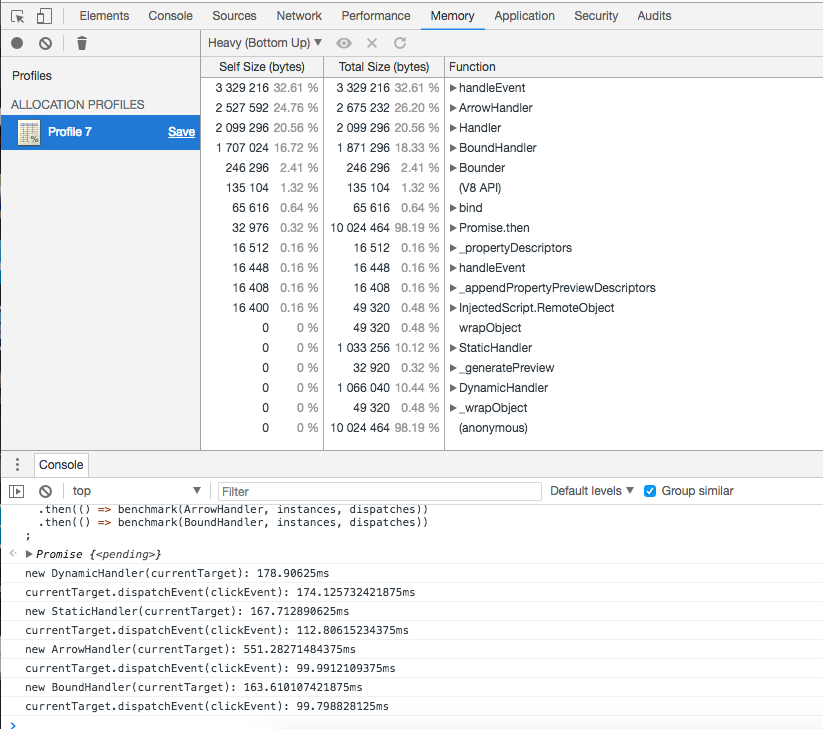Last active
November 13, 2021 20:52
-
-
Save WebReflection/5aaca727bc3b784d43be3704cf65abff to your computer and use it in GitHub Desktop.
Classes VS DOM Events Handling Benchmark
This file contains hidden or bidirectional Unicode text that may be interpreted or compiled differently than what appears below. To review, open the file in an editor that reveals hidden Unicode characters.
Learn more about bidirectional Unicode characters
| // Players | |
| class ClickCounter { | |
| constructor() { this.clicks = 0; } | |
| onclick(e) { this.clicks += (e.type === 'click') ? 1 : -1; } | |
| } | |
| class Handler extends ClickCounter { | |
| constructor(currentTarget) { | |
| super(); | |
| currentTarget.addEventListener('click', this); | |
| } | |
| } | |
| class DynamicHandler extends Handler { | |
| handleEvent(e) { this['on' + e.type](e); } | |
| } | |
| class StaticHandler extends Handler { | |
| handleEvent(e) { switch (e.type) { | |
| case 'click': return this.onclick(e); | |
| }} | |
| } | |
| // just to rule out hierarchy performance | |
| class Bounder extends ClickCounter { | |
| constructor(currentTarget) { super(); } | |
| } | |
| class ArrowHandler extends Bounder { | |
| constructor(currentTarget) { | |
| super(currentTarget); | |
| this.click = (e) => this.onclick(e); | |
| currentTarget.addEventListener('click', this.click); | |
| } | |
| } | |
| class BoundHandler extends Bounder { | |
| constructor(currentTarget) { | |
| super(currentTarget); | |
| this.onclick = this.onclick.bind(this); | |
| currentTarget.addEventListener('click', this.onclick); | |
| } | |
| } | |
| // Rules | |
| const benchmark = (Class, length = 1000, samples = 5) => { | |
| const currentTarget = button(Class.name); | |
| const instances = new Array(length); | |
| return new Promise(res => setTimeout(res, 500)).then(() => { | |
| let benchName; | |
| let memory; | |
| benchName = `new ${Class.name}(currentTarget)`; | |
| memory = performance.memory.usedJSHeapSize; | |
| console.time(benchName); | |
| for (let i = 0; i < length; i++) | |
| instances[i] = new Class(currentTarget); | |
| console.timeEnd(benchName); | |
| memory = performance.memory.usedJSHeapSize - memory; | |
| if (memory) console.log('memory: ', memory); | |
| const event = new Event('click'); | |
| benchName = 'currentTarget.dispatchEvent(clickEvent)'; | |
| memory = performance.memory.usedJSHeapSize; | |
| console.time(benchName); | |
| for (let i = 0; i < samples; i++) | |
| currentTarget.dispatchEvent(event); | |
| console.timeEnd(benchName); | |
| memory = performance.memory.usedJSHeapSize - memory; | |
| if (memory) console.log('memory: ', memory); | |
| console.assert( | |
| instances.every(instance => instance.clicks === samples), | |
| `expected ${length} clicks, got ${instances[0].clicks} instead` | |
| ); | |
| }); | |
| }; | |
| // Helpers | |
| const button = textContent => { | |
| const el = document.createElement('button'); | |
| el.textContent = textContent; | |
| return document.body.appendChild(el); | |
| }; | |
| // Race ! | |
| var instances = 10000; // how many instances ? | |
| var dispatches = 10; // how many dispatches ? | |
| Promise | |
| .resolve() | |
| .then(() => benchmark(DynamicHandler, instances, dispatches)) | |
| .then(() => benchmark(StaticHandler, instances, dispatches)) | |
| .then(() => benchmark(ArrowHandler, instances, dispatches)) | |
| .then(() => benchmark(BoundHandler, instances, dispatches)) | |
| ; |
I've posted a question on StackOverflow.
The answer is pretty simple.
handleEvent consumed that much memory due to issue in the benchmark.
The thing is that strings concatenation ('on' + e.type) causes new string allocation in heap on each iteration.
If we just replace this['on' + e.type] to switch(e.type) {case 'click': this.onclick(e);}, then we get results, which are reflecting initial idea regarding benefits of using handleEvent.

Sign up for free
to join this conversation on GitHub.
Already have an account?
Sign in to comment
Just one more thing.

I launched a code of this benchmark (Chrome Version 64.0.3282.186 (Official Build) (64-bit), MacOS High Sierra) and got some different results, which shows an enormous memory consumption for
handleEvent.@WebReflection, can you, please, comment on that?